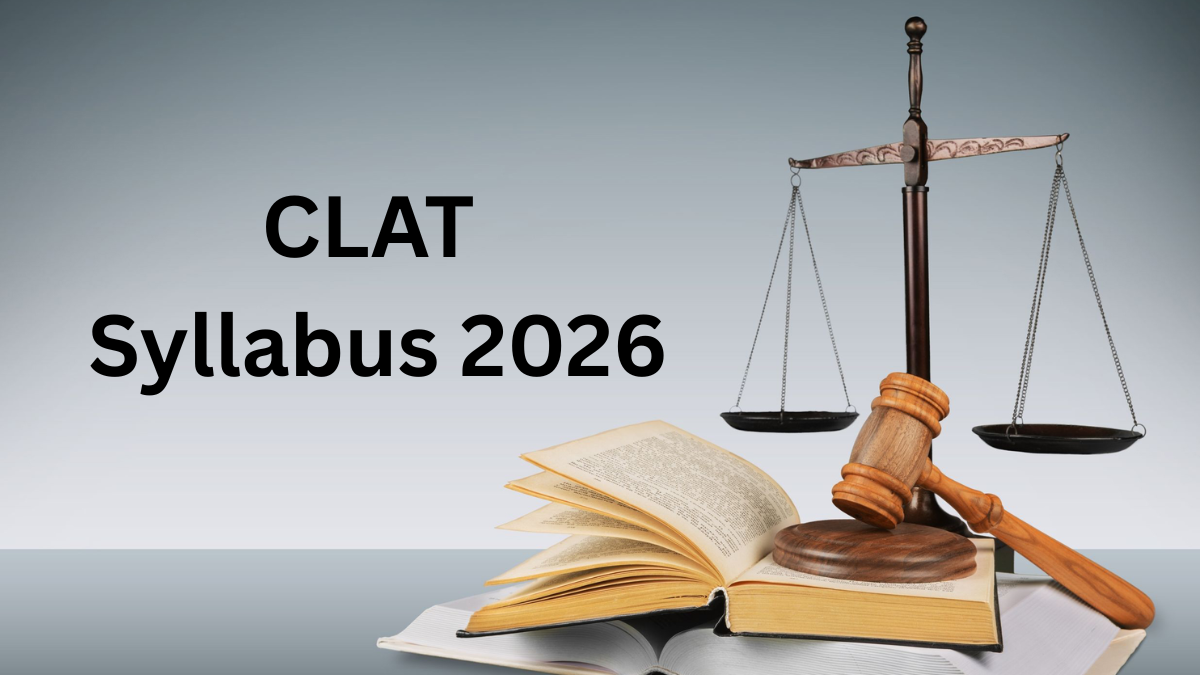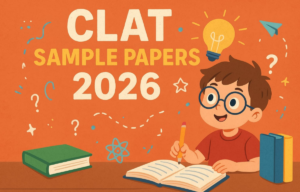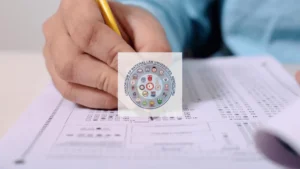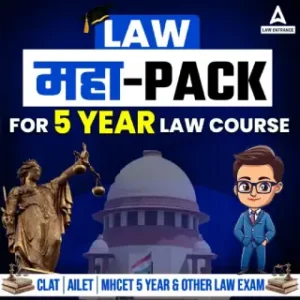The CLAT Syllabus 2026 covers reasoning and comprehension skills, both of which are required for legal studies. The CLAT syllabus is mostly focused on your ability to think clearly and understand numerous topics. The legal entrance exam will last two hours and consist of 120 multiple-choice questions. Each question is worth one mark; however, incorrect answers will result in a 0.25-mark penalty. These are the five subjects that will be covered on the test.
-
English Language
-
Current Affairs and General Knowledge
-
Legal Reasoning
-
Logical Reasoning
-
Quantitative Techniques
The CLAT 2026 UG Syllabus gives you a clear idea of what topics will be tested in each section to help you prepare.
CLAT 2026 Exam Highlights
Candidates can view a brief CLAT 2026 Syllabus & pattern highlights here.
| Particulars | Details |
| Number of sections | 5 |
| Sections name |
English Language, Legal Reasoning, Logical Reasoning, Current Affairs, including General Knowledge, and Quantitative Techniques
|
| Types |
Multiple-choice questions
|
| Maximum Marks | 120 |
| CLAT exam duration | 120 minutes |
| Mode of exam – Offline | Offline |
| Number of questions | 120 |
| Marking scheme |
+1 mark for each correct response
– 0.25 negative marking for incorrect answer |
CLAT 2026 Subject-wise Syllabus
A brief description of all subjects and their syllabus is listed in the table below.
| CLAT 2026 Syllabus UG | ||
| Sl. No | Subject | Syllabus |
| 1 | English Language | Passage Comprehension
|
| 2 | Current Affairs and General Knowledge | Passage-based questions
Required Knowledge
|
| 3 | Legal Reasoning | Passage-based questions
|
| 4 | Logical Reasoning | Passage-based questions
|
| 5 | Quantitative Techniques | Passage/Graphs/Other Representations
Required Knowledge
|
Syllabus of CLAT Weightage
| CLAT Section Wise Weightage, Marks, Number of Questions Asked | |||
| Section | Weightage (%) | Questions | Marks |
| Current Affairs, including General Knowledge | 23.33 – 26 | 28-32 | 35 – 39 |
| English Language | 18.66 – 21.33 | 22-26 | 28 – 32 |
| Logical Reasoning | 18.66 – 21.33 | 22-26 | 28 – 32 |
| Quantitative Techniques | 8.66 – 11.33 | 10-14 | 13 – 17 |
| Legal Reasoning | 23.33 – 26 | 28-32 | 35 – 39 |
| Total | 100 | 120 | 120 |
CLAT Syllabus PDF Download (Free)
CLAT UG syllabus consists of subjects such as general knowledge, current affairs, legal reasoning, logical reasoning, maths, and English.
CLAT Syllabus PDF Direct link: CLAT Syllabus 2026 PDF
CLAT PG 2026 Syllabus
The syllabus of the CLAT PG 2026 exam, based on the previous year’s paper, is provided in the following table.
| Sr. No. | Subject | Syllabus |
| 1 | Constitutional Law | The Indian Constitution, Fundamental Rights, Fundamental Duties, The Supreme Court, Parliament, Committees and Commissions, Historical Amendments, Commerce, Scheduled Areas |
| 2 | Jurisprudence | Definition of Jurisprudence, Ownership and Possession, Liabilities (person and corporate), Law and Morals, Theories and Punishments, Jural Analysis |
| 3 | Administrative Law | Definition, Principles of Natural Justice, Need for Administrative direction, Statutory Provisions, Administrative Discretion and Remedies, Administrative Adjudication, Doctrine of Estoppel, Relationship between Constitutional Law and Administrative Law |
| 4 | Law of Contracts | Basic elements: Communication, Acceptance, and Revocation of Offer; Capacity and Privity of Contract; Wagering Agreements, Breach of Contract and Remedies for breach, Indemnity, Force Majeure & Doctrine of Frustration |
| 5 | Torts | Origin of Law of Torts in India, Definition, Criticism of Winfield, Tortious Liability, Several and Independent Tortfeasors, General Defences, Act of God & Private Defence, Strict and Absolute Liability, Negligence, Defamation, Consumer Protection |
| 6 | Criminal Law | Introduction, Criminal Courts in India, Stages of Trial, Plea, Bargaining, Bail, Vitiation of Proceedings, Inherent Power |
| 7 | Property Law | Outline, Types of Properties, Concept of Sale, Lease, Mortgage, Exchange, Gift, Will |
| 8 | Public International Law | Overview, Sources, Treaties, International Organizations, State Recognition, State Succession, Human Rights, Law of the Sea, Air and Space, Settlement of Disputes |
| 9 | Environmental Law | The Water (Prevention and Control of Pollution) Act 1974, The Air (Prevention and Control of Pollution) Act 1981, The Environment (Protection) Act 1986
The National Environment Tribunal Act, 1955, Indian Forest Act 1927, The Forest (Conservation) Act, 1980, The Wildlife (Protection) Act, 1972, Public Liability Insurance Act, 1991, Recognition of Forest Rights Act 2006, International Environment Law |
| 10 | Labour and Industrial Law | Concept of Industrial Relations, Industrial Relations Code 2020, Code on Social Security 2020, Code on Occupational Safety, Health and Working Conditions 2020, Code on Wages 2020, Industrial Disputes Act, The Factories Act, 1948, The Standing Orders Act, Recent amendments in Labour Laws |
CLAT PG Syllabus PDF
The CLAT PG (Common Law Admission Test for Postgraduate) syllabus is all about the understanding of various legal disciplines. It covers Constitutional Law, Jurisprudence, Administrative Law, Contract Law, Torts, Family Law, Criminal Law, Property Law, Company Law, Public International Law, Tax Law, Environmental Law, and Labour & Industrial Law. Additionally, the syllabus involves contemporary legal issues and the application of law in practical scenarios.
Download 2026 CLAT PG Syllabus
How to Prepare for CLAT 2026 Using the Syllabus
-
Give more time to big sections: Current Affairs and Legal Reasoning carry more marks, so focus extra on them, but don’t ignore the smaller parts.
-
Read daily: Read newspapers, magazines, or simple non-fiction books. This helps with English, General Knowledge, and Legal topics.
-
Practice reading passages: Most questions come from long passages. Practice reading fast, understanding them, and answering correctly.
-
Solve mock tests and old papers: This makes you familiar with the exam, helps manage time, and shows your weak areas.
-
Revise basic maths: Go over simple topics like percentages, ratios, and speed/time problems from school maths.
-
Improve English: Learn new words and practice grammar so you can do better in the English section.
Check:- CLAT Final Answer Key 2026
Best CLAT UG Books
Get the best CLAT UG book recommendations subject-wise here –
CLAT English Language Books
To prepare for the CLAT English language portion, the candidate must not only be able to read quickly but also comprehend what is written in the chapter. Here are some book suggestions to help you prepare for the exam.
- The Pearson Guide to the CLAT (English)
- Word Power Made Easy New Revised & Expanded Edition (English) by Norman Lewis
- Objective General English (English) by RS Aggarwal
- High School English Grammar & Composition (English) by PC Wren, H Martin
- High School English Grammar by Wren and Martin
Current Affairs and GK Books
Here are some books to assist you in preparing for the CLAT Current Affairs and GK section.
- Manorama Yearbook – General Knowledge
- Lucent’s General Knowledge
- Pratiyogita Darpan.
- Pearson’s Concise GK Manual
- Competition Review Yearbook.
CLAT Quantitative Techniques Books
The quantitative component for CLAT will be at the tenth level, so get plenty of experience by solving example papers and problem sets provided at the end of each chapter. Also, examine the reference books below:
- S Chand’s 30 Days Wonder for Maths
- 10th NCERT book.
- Quantitative Aptitude ebook (All Parts Solved) by RS Aggarwal.
- Maths 18 Days Wonder by S Chand
CLAT Legal Reasoning Books
Here are some publications that will help you master the CLAT Legal Reasoning Section. References include –
- Bhardwaj’s Legal Awareness and Legal Aptitude,
- LST’s Legal Reasoning Module
- National dailies such as The Hindu and The Indian Express.
- Universal’s CLAT Guide, and
- YouTube channels
CLAT Logical Reasoning Books
Here are a few reference books for CLAT logical reasoning.
MK Pandey’s Analytical Reasoning
501Challenging logical reasoning practice book.
Verbal and Nonverbal Reasoning by RS Aggarwal
A Modern Approach to Logical Reasoning by RS Aggarwal.









 CLAT Colleges 2026 List: Check Top Unive...
CLAT Colleges 2026 List: Check Top Unive...
 CLAT Sample Papers 2026 Released by Cons...
CLAT Sample Papers 2026 Released by Cons...
 Download CLAT Previous Year Question Pap...
Download CLAT Previous Year Question Pap...








